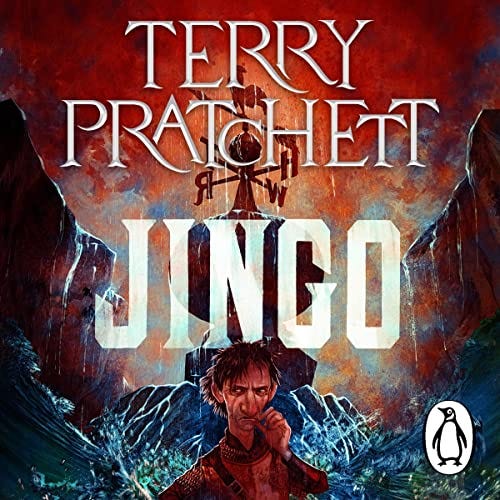Jingo
Terry Pratchett
Terry Pratchett's cryptically named Jingo is the twenty-first novel in his Discworld series and the fourth in that most political of its subseries, the City Watch series. It follows Feet of Clay, which is, in my estimation the best Discworld novel to this point in the series. Jingo is not, in my opinion, quite as good.
Like all the City Watch novels (so far -- I am only up to number four), Jingo features virtuous everyman Samuel Vimes battling Evil with humility, good sense, and a strong sense of justice. In this case the evil against which Vimes is opposed is war. An island, Leshp, appears in the sea between Ankh-Morpork and Klatch, and both nations (Is Ankh -Morpork a nation? Not important...) lay claim to it and send military forces against each other.
Although Vimes is a star, I felt the most important character of Jingo was another Discworld perennial: Lord Havelock Vetinari, the Patrician (chief executive/dictator) of Ankh-Morpork. Vetinari has gradually become more interesting as Discworld proceeds. He first appears in Book 1 of the series, The Colour of Magic. In his early appearances he serves mainly as comic relief, ridiculed for his extremely flexible approach to moral questions. But he grows as the series proceeds. By the end of Feet of Clay he is recognizably a master manipulator who sees it as his job to make Ankh-Morpork work, for values of "work" that closely approximate the Utilitarian ideal of "The greatest good for the greatest number." He is not a likeable man -- he's not meant to be.
In Jingo, Lord Vetinari outshines even Sam Vimes, or at least he did for me. He's the only person who seems to understand everything going on, and the only person in control. I found, at the end, it was even possible to like Vetinari.
I think I enjoyed Jingo less than Feet of Clay because the lesson of Jingo, "War is bad" is, at this point in history, somehow less interesting than that of Feet of Clay, "No kings, no slaves." That is a historically contingent claim. There have certainly been times in history when war was broadly regarded as a good thing, and there have been times when authoritarianism was almost universally condemned. But right now, in 2025, Jingo is pushing on an open door.




